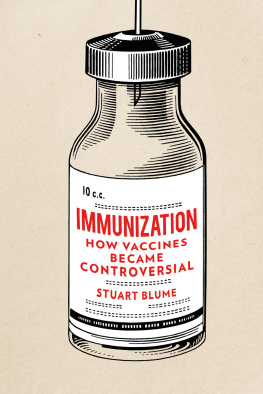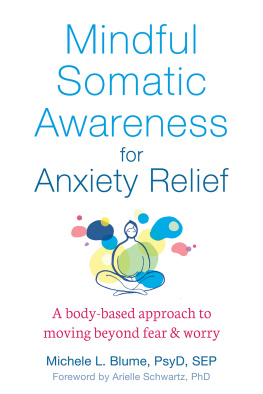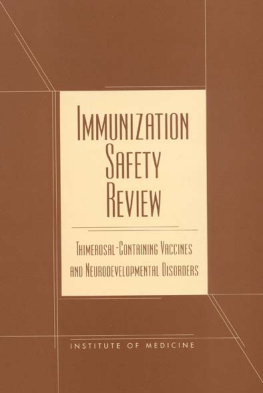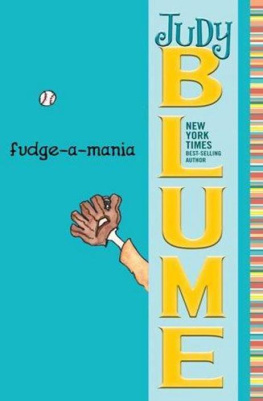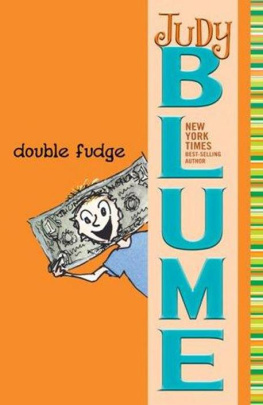Stuart Blume - Immunization
Here you can read online Stuart Blume - Immunization full text of the book (entire story) in english for free. Download pdf and epub, get meaning, cover and reviews about this ebook. year: 2017, genre: Politics. Description of the work, (preface) as well as reviews are available. Best literature library LitArk.com created for fans of good reading and offers a wide selection of genres:
Romance novel
Science fiction
Adventure
Detective
Science
History
Home and family
Prose
Art
Politics
Computer
Non-fiction
Religion
Business
Children
Humor
Choose a favorite category and find really read worthwhile books. Enjoy immersion in the world of imagination, feel the emotions of the characters or learn something new for yourself, make an fascinating discovery.
- Book:Immunization
- Author:
- Genre:
- Year:2017
- Rating:3 / 5
- Favourites:Add to favourites
- Your mark:
- 60
- 1
- 2
- 3
- 4
- 5
Immunization: summary, description and annotation
We offer to read an annotation, description, summary or preface (depends on what the author of the book "Immunization" wrote himself). If you haven't found the necessary information about the book — write in the comments, we will try to find it.
Immunization — read online for free the complete book (whole text) full work
Below is the text of the book, divided by pages. System saving the place of the last page read, allows you to conveniently read the book "Immunization" online for free, without having to search again every time where you left off. Put a bookmark, and you can go to the page where you finished reading at any time.
Font size:
Interval:
Bookmark:

IMMUNIZATION

How Vaccines Became
Controversial
Stuart Blume
REAKTION BOOKS
Published by Reaktion Books Ltd
Unit 32, Waterside
4448 Wharf Road
London N1 7UX, UK
www.reaktionbooks.co.uk
First published 2017
Copyright Stuart Blume 2017
All rights reserved
No part of this publication may be reproduced, stored in a retrieval system, or transmitted, in any form or by any means, electronic, mechanical, photocopying, recording or otherwise, without the prior permission of the publishers
Printed and bound in Great Britain
by TJ International, Padstow, Cornwall
Page references in the Photo Acknowledgements and
Index match the printed edition of this book.
A catalogue record for this book is available from the British Library
eISBN: 9781780238685
Hope
I f its films are any kind of guide, the English-speaking world views the prospect of a pandemic with the fascination of a trapped man watching an approaching snake. There is a sense of horror, of inevitability. Films about epidemics show us people in their thousands (or more) dropping in the streets, social disintegration and approaching havoc. However, there is a catharsis. In many of these films there are heroes or heroines, doctors or scientists, who ultimately save what is left of the human race. Some of these movies, such as John Fords 1931 film of Sinclair Lewiss novel Arrowsmith, were made long ago, but most are fairly recent. Think of the 1995 film Outbreak, starring Dustin Hoffman and Morgan Freeman. Or the 2007 film I Am Legend, starring Will Smith. Or the popular TV series The Last Ship. Or Steven Soderberghs gripping 2011 version, Contagion. Soderberghs film opens with an American business executive, Beth Emhoff, taken ill on her way home from Hong Kong. Shes coughing and sweating. We see others similarly affected, in Hong Kong, London, Tokyo... This is turning into a public health emergency though it is totally unclear how it started, or where, or what is causing it. It is a private tragedy as well. Of course it is many private tragedies, but the film focuses on how Beths collapse and rapid death affect her family. Her husband Mitch is at first incredulous, then bereft, then put into an isolation ward, and finally discovered to be immune. The public health side of things focuses on the Center for Disease Control (CDC) based in Atlanta, Georgia, and in particular on an epidemiologist named Erin Mears who has to trace and map the spread of the disease, on her boss Ellis Cheever, and on Ally Hexhall, a virologist wholl be given the job of identifying the causal agent, which proves to be a virus. The action shifts to Geneva, where the World Health Organization (WHO) is based, and where reports are coming in of deaths and millions of cases from some of the worlds most densely populated metropolises. The WHO, which has developed protocols for dealing with this kind of emergency, is going to send Dr Leonora Orontes to investigate. What precautionary measures should governments be advised to take? Should schools be closed? Is there a risk of panicking people needlessly? How does the virus spread? Epidemiological investigation would have to establish how infectious it is. What kind of virus is it? Is there a chance that a known pathogen (anthrax? smallpox? Bird flu?) has been turned into a weapon and that this epidemic has been started deliberately?
Its the work of epidemiologist Mears (out in the field) and of the virologists manipulating samples in their laboratories that forms the core of the movie. Because Mears is able to establish that Beth was patient number 1, and that she became sick as a result of eating some infected poultry, and because the virologists succeed in identifying and then growing the virus, a vaccine can be made and mankind saved. But this isnt a documentary, so its embellished by a number of dramatic flourishes, some of which point neatly to real-life complications, dilemmas and concerns. Orontes, who is dispatched to Hong Kong, suspects that that is where it all started, but discovers that the authorities are anxious to prevent any such announcement being made. Moreover, plenty of people think there is money to be made. We are introduced to Alan Krumwiede, an influential (but shady) blogger, who claims that theres a simple, cheap natural cure for the disease, which the public health establishment and the pharmaceutical industry are keeping secret. They want to develop and profit from an expensive vaccine. We subsequently learn that he is hoping to make money himself from this plant extract. Demand becomes insatiable, and riots break out at drugstores across the USA as people try to get hold of it. There are roadblocks and looting. The impression we are given is that the social disruption caused by the epidemic is at least as serious, and certainly as frightening, as the virus. An epidemiology of fear is evoked. As one of the characters points out, in order to get sick you have to be in contact with an infected person or something that theyve touched. In order to get scared you just have to get in contact with TV or the Internet.
If this was a reflection on an era when there were no virologists, written for an age when time and space hadnt been compressed to the extent they are today, then Contagion provides us with an update. It offers a way of imagining and writing about epidemics as they evolve, as they spread, and as the desperate search for control today centred more on the laboratory than on the house of prayer gathers pace.
Fear
When we are told that some horrific pandemic is in prospect something like the 1918 Spanish flu that killed tens of millions of people (an estimated 3 to 5 per cent of the worlds population), or that a previously unknown virus has emerged from its remote jungle home (as in Contagion) we now turn expectantly to virologists like Ally Hexhall and the high-security labs in which they go about their business. An example that hit the news in the first weeks of 2016, and that almost no one who wasnt a virologist had heard of up till then, is the Zika virus. It was discovered in the Zika forest, in Uganda, by researchers who were actually investigating yellow fever. Both viruses, and that responsible for dengue, are spread by the same species of mosquito, Aedes aegypti. Infection with the Zika virus was nothing to panic about. Although the virus had been found in 1947, the first reported case of someone becoming sick from it was only in 1964. After three days of fever and some aches and pains, the victim had fully recovered. Studies showed that many cases of infection were totally without symptoms. But as the virus was carried further afield its effects appeared to change. Epidemics in various Pacific islands in the early 2000s showed more serious symptoms, in particular Guillain-Barr syndrome. And then it found its way to Central and South America. Evidence began to accumulate that if a pregnant woman became infected her baby might be born with an abnormally small head (a condition known as microcephaly). A significantly higher than usual number of babies have been born with microcephaly in Brazil, where the virus has spread rapidly. Researchers are discovering that it is not only mosquitoes that spread it. Some women seem to have picked it up from infected semen and possibly even from sweat. Work on developing a vaccine is under way: in Brazils Butantan Institute; in the U.S. National Institute of Health; in pharmaceutical giants like GSK and Sanofi Pasteur; and in some small biotechnology companies. Estimates as to when it might become available differ enormously. Of course it is not as though nothing is being done while the vaccine is being developed. While the scientists are working, something has to be done to help people who are affected (there is no anti-Zika drug yet) and also to limit the spread of the contagion. Simple measures like covering barrels of drinking water can help. Restricting peoples movements, especially people who might be infected, has been used for centuries to limit the spread of infectious disease. Now there are new and more sophisticated ways of identifying people who might be infected. That is why, a few years ago, many airports installed thermal scanners. They were intended to identify passengers whose raised body temperature indicated possible swine flu.
Font size:
Interval:
Bookmark:
Similar books «Immunization»
Look at similar books to Immunization. We have selected literature similar in name and meaning in the hope of providing readers with more options to find new, interesting, not yet read works.
Discussion, reviews of the book Immunization and just readers' own opinions. Leave your comments, write what you think about the work, its meaning or the main characters. Specify what exactly you liked and what you didn't like, and why you think so.

